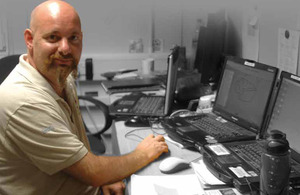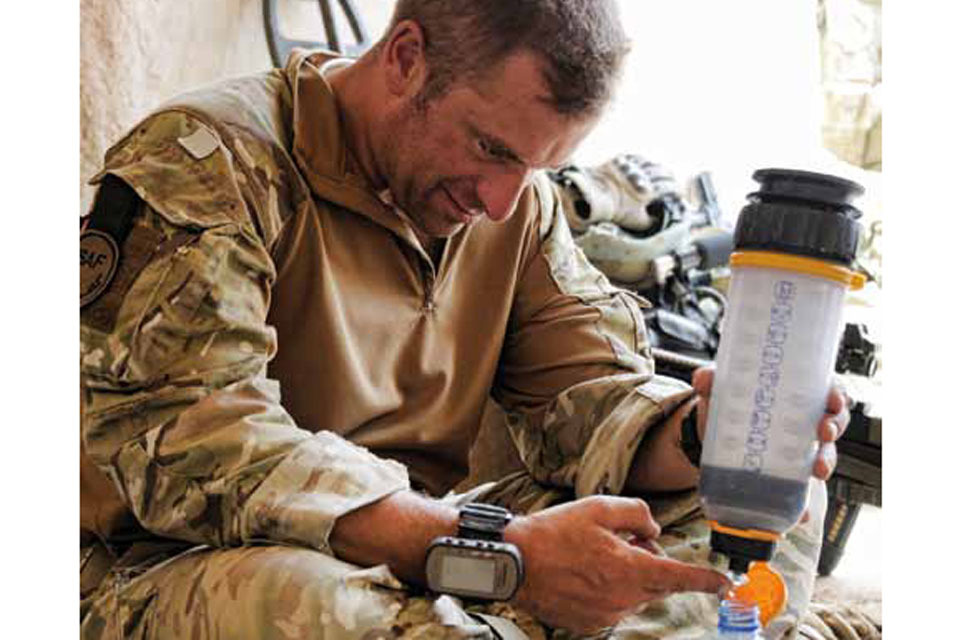MOD scientist advises troops in Afghanistan
Providing UK troops on the front line in Afghanistan with advice on anything from what fertiliser may be used to make Taliban bombs to how the latest bomb-proof pants are working out is MOD scientist Matt Simpson

Matt Simpson delivering advice from Lashkar Gah [Picture: Captain Charlie Walsh, Crown Copyright/MOD 2011]
We read all the time about the fantastic improvements in equipment developed for our Armed Forces.
We watch amazed at the incredible vehicles and weapons, some of which wouldn’t look out of place in futuristic computer games, despatched to Afghanistan to keep our troops safe and the enemy on the back foot.
Usually this techno-wizardry, rather banally described in military-speak as ‘capability’ or ‘assets’, is the scientific and engineering solution provided through Urgent Operational Requirements. That process depends on MOD and industry working closely together. But it also depends on the work of the MOD’s Scientific Advisors (SCIADs).
The battlespace (it’s not a battlefield anymore) is a hi-tech environment, and the kit you find there doesn’t just get ‘magicked up’ by industry.
Understanding the problems, providing solutions, and then testing and analysing new kit is where the SCIAD comes in. But the SCIAD must also be on hand to provide routine scientific advice.
Matt Simpson, a radiochemist from the Defence Science and Technology Laboratory (Dstl), is one of those backroom boys. His backroom is at the Main Operating Base in Lashkar Gah, at what he calls ‘the fighting end of the support provision’.
However, Matt is not in theatre just because of his Chemical, Biological, Radiological and Nuclear (CBRN) background, or because of his master’s degree in chemistry:
My specialism is not relevant,” he said. “What matters is your grasp of the scientific process and the ability to apply that across a wide range of disciplines.
The selection process that Matt had to undergo to make sure he was right for the job was, in his words, rigorous:
They test your technical ability and how good you are at following sound scientific thought processes with limited information while under stress.

Using the water filter means troops need to carry less weight [Picture: Sergeant Alison Baskerville, Crown Copyright/MOD 2011]
Having proved that he was made of the right stuff, Matt was put through an intensive briefing programme so that he would know the sort of thing he would be dealing with in theatre:
I attended more than 80 technical briefings and visited ten different sites across Dstl, Main Building, DE&S [Defence Equipment and Support] and industry.
The work is so critical that Matt has instant access to scientific experts across MOD, Dstl and industry to call on if he needs technical support:
I work 12- to 14-hour days, seven days a week, there’s enough to keep me busy,” said Matt.
The call on his services can come at any time, and can be a request that only calls for a simple grasp of chemistry:
For example, I get asked about the chemical make-up of fertilisers, and how to test for certain chemicals and their concentrations. Certain fertilisers are banned as you can make explosives out of them. So if guys on patrol come across a store of fertiliser, they need to know if it’s OK or suspicious.
Other work could involve him in lengthy detailed analysis and research. SCIADs played a crucial role in collating and assessing feedback from front line soldiers on the newly-introduced pelvic protection system, or what the tabloids called ‘bomb-proof underpants’.
The three-tiered system of clothing and armour consists of special protective underwear (Tier 1) and detachable armoured modules (Tiers 2 and 3). The equipment is designed to prevent the ingress of foreign material in the event of an explosion with the aim of reducing the severity of injuries.
The scientists had to be sure that the system was effective, that it didn’t hinder the troops using it, and that it didn’t solve one problem only to create another:
Troops are already significantly burdened. It’s my responsibility to look at the effect pelvic protection will have on thermal and physical burden,” said Matt.
Part of the work involved the gathering of information from troops operating with Tier 1 pelvic protection by getting them to fill out carefully constructed questionnaires:
The quality of information was reasonably good. The soldiers knew we were trying to solve a problem that affected them directly, so they took it seriously.
As a professional scientist Matt knows to look beyond what may appear irrelevant to a layman and identify what could have a critical influence on how well the kit will work:
Remember, the guys may have to wear this stuff for hours at a time. We need to balance any discomfort against the perceived value of the kit.
We had an initial 75 per cent return saying that the discomfort was worth the protection, which is pretty good.
Another issue examined by SCIADs relates to the burden involved in the carriage of water. Soldiers operating in stressful conditions where temperatures can reach 55 degrees Celsius clearly need to drink lots of water, and that means carrying it with them. Water is heavy so having to carry the extra weight only adds to the problem:
Everyone knew it was an issue, but just how serious it was wasn’t known. We broke the problem down and worked out that on a typical foot patrol a soldier could be required to carry up to six litres of water. That’s a huge added burden.
To help ease this problem Matt has been working on the newly-introduced water filtration pump that many troops now pack in their day sacks. It means that when on patrol troops can use the pump to provide as much safe and palatable drinking water as they need.
The pump is a little bulky, but the widely held view among the guys is that it is a top piece of kit to have, and the water tastes OK.
Helping to improve life for the troops in this way is why Matt wants to do this work:
I know I can make a difference here, and the difference I make is obvious and often very immediate. That is very satisfying.